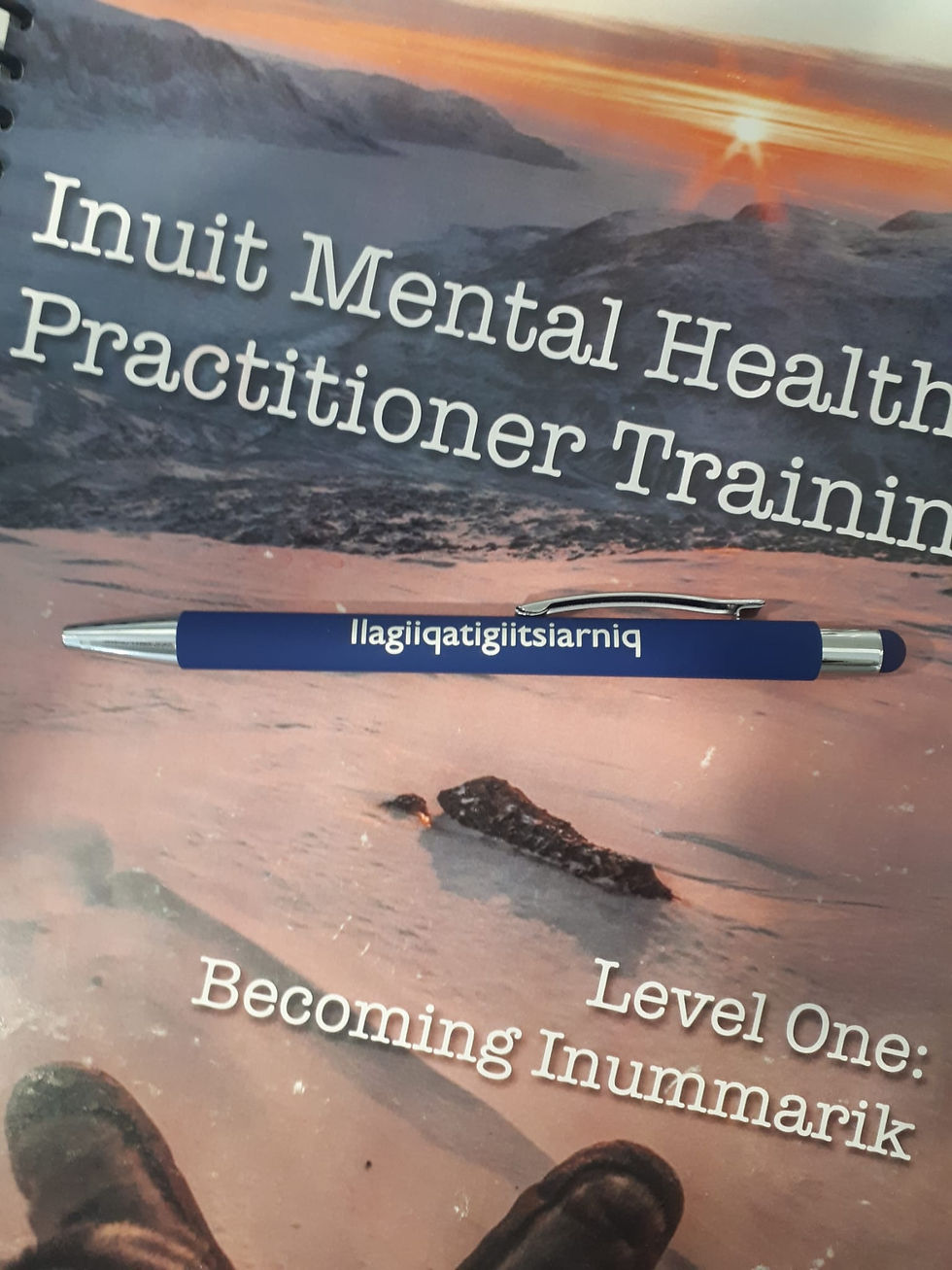Our Three-Level Program
Becoming Inummarik represents Level 1 of a comprehensive program for Inuit mental health capacity building:
Level 1: "Heal the Healer"
(Current Program)
Becoming Inummarik provides foundational psycho-emotional education and healing opportunities for Inuit community members.
Level 2: "Helping Others"
(In Development)
Advanced training in Inuit-specific therapeutic methods for those seeking to become counselors or therapists in their communities.
Level 3: "Community Healing"
(Planned)
Leadership training for holistic mental health leaders who can run community programs and wellness events.
.jpeg)
Bryan Winters
Ordinary Member for the Canadian Constituency & Speaker of the Nunatsiavut Assembly
Facilitator of Becoming Inummarik
The Becoming Inummarik program grew out of a recognized need for Inuit to work through our emotions and traumas with other Inuit. The program has given us the opportunity to sit with one another and discuss our shared experiences to help us feel more connected, seen and heard in a culturally congruent way.
This work grew organically from a partnership with the Mandala Institute of Holistic Mental Health, experienced mental health practitioners who helped guide the research and creation of this program and its methods.
The membership of our cohorts come from a variety of backgrounds and fields but often repeat a similar experience of having never asked themselves the questions our program presents, nor had the opportunity to discuss these questions and benefit from sharing their answers amongst other Inuit in a safe, understanding environment.
_edited.png)
Karen Aglukark
BA Psychology
Facilitator of Becoming Inummarik
Participating in the training was an incredible experience that opened my eyes to the power of connecting with community members in a warm, supportive environment. As I continue my studies, I see more clearly how Western methods often don’t fully resonate with our communities.
Being part of the pilot program for Becoming Inummarik has been a game-changer. It’s shown me that Inuit communities can shape how mental health services are delivered to us.
Watching participants transform has revealed what’s possible for community healing and helped me see the role I can play—one that supports my own wellbeing and aligns with my vision for healthy, thriving Inuk communities.
Since the pilot, I’ve become a co-facilitator and advocate for the program, excited to carve a path for other Inuit who aspire to make a meaningful contribution in Inuit mental wellness.
.jpeg)
Kelly Michelin-Morrissey
Senior Management at an Inuit-Serving Organization
Facilitator of Becoming Inummarik
Kelly Michelin-Morrissey is originally from Happy Valley-Goose Bay, Labrador. She has a degree in Social Work from Memorial Universitty and has been working in Inuit mental health and social services for over 10 years.
Kelly was first a participant in the Becoming Inummarik pilot program, and is now a facilitator of the program.
Going from Vision to Impact: Becoming Inummarik
Our flagship program, Becoming Inummarik ("a whole human being" or "a person who acts with wisdom" in Inuktitut), represents the first level of our comprehensive vision for Inuit mental health capacity building.
This 120-hour, three-week program combines psycho-emotional and psycho-social education with group sharing and storytelling, creating culturally safe spaces for healing and learning. Guided by IQ (Inuit Qaujimajatuqangit) principles, the program takes a decolonized approach to mental health education and community healing.
Program Impact:
-
Nearly 150 Inuit-serving frontline workers and community members trained
-
13 organizational cohorts across Nunavut, Nunavik, Ontario, and Manitoba
-
800 contact hours delivered through co-facilitation model
-
Growing Inuit leadership and facilitator development

The Inuit Mental Health Model
Before developing any programming, we conducted extensive research based on what Inuit elders, leaders, researchers, and mental health advocates have shared on both traditional and contemporary approaches to healing, trauma, and wellness, as well as Inuit-sourced ideas on what Inuit and Inuit communities need to heal and move forward.
This groundbreaking work resulted in our comprehensive 53-page Inuit Mental Health Model; a compilation of all available Inuit-sourced materials related to mental health and well-being.
Key Insights from Our Research:
-
The trauma burden carried by most Inuit requires "heal-the-healer" programming before advancing to counselor training
-
There is a critical need for culturally appropriate, Inuit-delivered mental health services
-
Three levels of community-based training are essential for building sustainable Inuit mental health capacity
Inuit Mental Health
Collaborative Development of Inuit-Specific Mental Health Solutions
The Vision
For decades, Inuit elders, activists, and advocates have called for Inuit-specific mental health training programs to address the ongoing mental health crisis within Inuit communities. The need for decolonized mental health programming that honours Inuit culture, knowledge systems, and healing traditions has largely gone unaddressed. Until now.
Through seven years of collaborative development with Inuit mental health leaders, we've created sustainable, community-centered solutions that bridge traditional Inuit wisdom with modern and holistic mental health approaches and practices.

Our Collaborative Foundation
Our work with Inuit communities began through meaningful partnerships with respected Inuit leaders who recognized the natural alignment between holistic mental health approaches and traditional Inuit teachings and philosophies.
Along the Journey, Our Collaborators Have Included:
-
Inuit wisdom-keeper, activist, and Officer of the Order of Canada Aaju Peter
-
Juno Award-winning performer, Officer of the Order of Canada, and Arctic Rose Foundation founder Susan Aglukark
-
Deputy Premier of Nunavut Pamela Gross
-
Inuit Tattoo Revitalization Project founder Hovak Johnston
-
Bryan Winters, Ordinary Member and Speaker of the Nunatsiavut Assembly
-
Karen Aglukark, BA Psychology and Inuit Mental Health Advocate
-
Kelly Michelin-Morrissey, Social Worker in an Inuit-serving community organization
This collaborative, community-centered approach has been fundamental to developing programming that is truly by Inuit, for Inuit.
%20(1).png)
